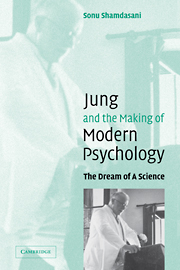Prologue: “The most cursed dilettante”
Published online by Cambridge University Press: 22 September 2009
Summary
“Don't make a legend of me.”
C. G. Jung, 1930.Occultist, Scientist, Prophet, Charlatan, Philosopher, Racist, Guru, Anti-Semite, Liberator of Women, Misogynist, Freudian Apostate, Gnostic, Post-Modernist, Polygamist, Healer, Poet, Con-Artist, Psychiatrist and Anti-Psychiatrist – what has C. G. Jung not been called? Mention him to someone, and you are likely to receive one of these images. For Jung is someone that people – informed or not – have opinions about. The swift reaction time indicates that people respond to Jung's life and work as if they are sufficiently known. Yet the very proliferation of “Jungs” leads one to question whether everyone could possibly be talking about the same figure.
In 1952, Jung responded to the fact that he had been variously described as a theist, an atheist, a mystic, and a materialist by noting: “When opinions over the same subject differ widely, according to my view, there is the well-founded suspicion that none of them is correct, i.e., that there is a misunderstanding.” Nearly fifty years later, the number of divergent views and interpretations of Jung has prodigiously multiplied. He has become a figure upon whom an endless succession of myths, legends, fantasies, and fictions continues to be draped. Travesties, distortions, and caricatures have become the norm. This process shows no signs of abating.
From early on, Jung was subject to a welter of rumors.
- Type
- Chapter
- Information
- Jung and the Making of Modern PsychologyThe Dream of a Science, pp. 1 - 28Publisher: Cambridge University PressPrint publication year: 2003



